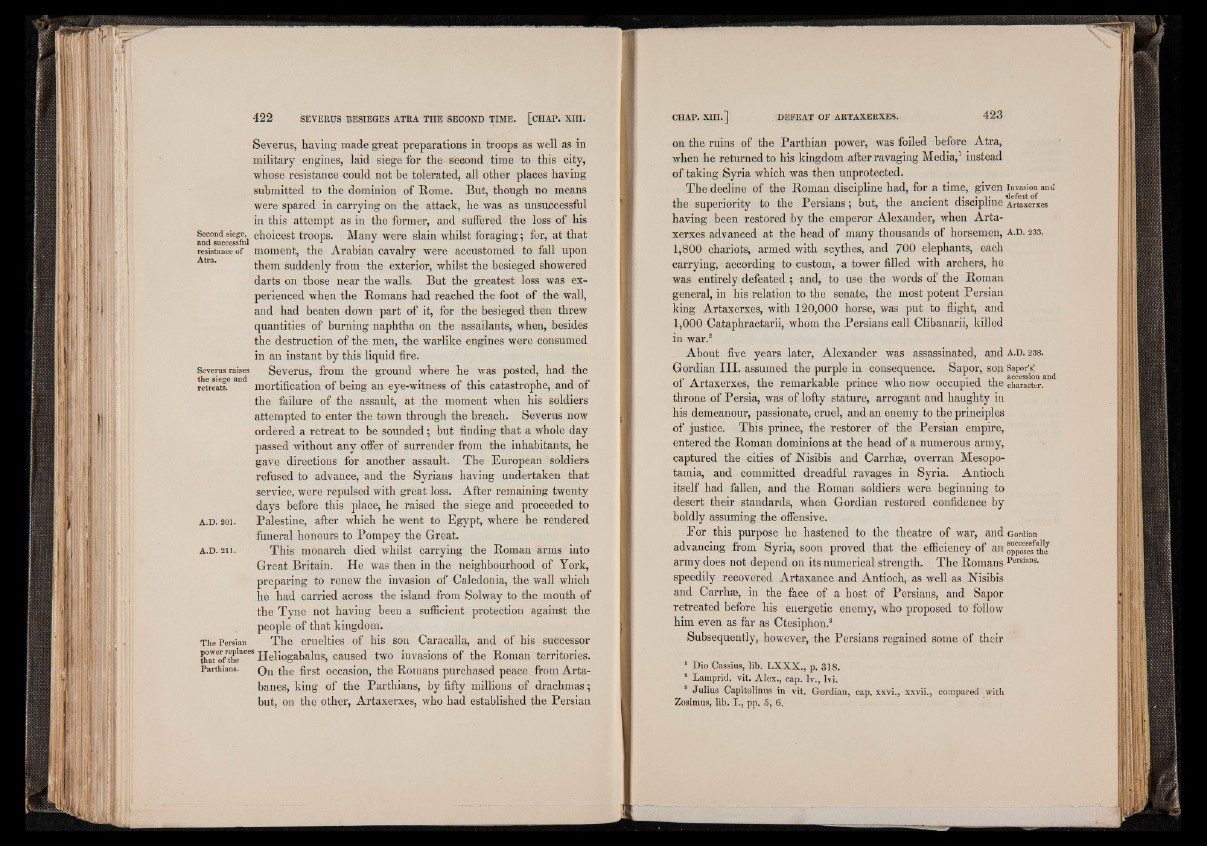
Severus, having made great preparations in troops as well as in
military engines, laid siege for the second, time to this city,
whose resistance could not be tolerated, all other places having
submitted to the dominion of Rome. But, though no means
were spared in carrying on the attack, he was as unsuccessful
in this attempt as in the former, and suffered the loss of his
Second siege, choicest troops. Many were slain whilst foraging; for, at that
and successful i * i • i 0 0 / /
resistance of moment, the Arabian cavalry were accustomed to tall upon
them suddenly from the exterior, whilst the besieged showered
darts on those near the walls. But the greatest loss was experienced
when the Romans had reached the foot of the wall,
and had beaten down part of it, for the besieged then threw
quantities of burning naphtha on the assailants, when, besides
the destruction of the men, the warlike engines were consumed
in an instant by this liquid fire.
Severus raises Severus, from the ground where he was posted, had the
retreats. mortification of being an eye-witness of this catastrophe, and of
the failure of the assault, at the moment when his soldiers
attempted to enter the town through the breach. Severus now
ordered a retreat to be sounded; but finding that a whole day
passed without any offer of surrender from the inhabitants, he
gave directions for another assault. The European soldiers
refused to advance, and the Syrians having undertaken that
service, were repulsed with great loss. After remaining twenty
days before this place, he raised the siege and proceeded to
a .d . 201. Palestine, after which he went to Egypt, where he rendered
funeral honours to Pompey the Great.
a .d . 211. This monarch died whilst carrying the Roman arms into
Great Britain. He was then in the neighbourhood of York,
preparing to renew the invasion of Caledonia, the wall which
he had carried across the island from Solway to the mouth of
the Tyne not having been a sufficient protection against the
people of that kingdom.
The Persian The cruelties of his son Caracalla, and of his successor
thaTofthe*1068 Heliogabalus, caused two invasions of the Roman territories.
Parthians. Q n fir s t; occasion, the Romans purchased peace, from Arta-
banes, king of the Parthians, by fifty millions of drachmas;
but, on the other, Artaxerxes, who had established the Persian
on the ruins of the Parthian power, was foiled before Atra,
when he returned to his kingdom after ravaging Media,1 instead
of taking Syria which was then unprotected.
The decline of the Roman discipline had, for a time, given invasion and
the superiority to the Persians; but, the ancient discipline Artaxerxes
having been restored by the emperor Alexander, when Artaxerxes
advanced at the head of many thousands of horsemen, a .d . 233.
1,800 chariots, armed with scythes, and 700 elephants, each
carrying, according to custom, a tower filled with archers, he
was entirely defeated ; and, to use the words of the Roman
general, in his relation to the senate, the most potent Persian
king Artaxerxes, with 120,000 horse, was put to flight, and
1,000 Cataphractarii, whom the Persians call Clibanarii, killed
in war.2
About five years later, Alexander was assassinated, and a .d . 238.
Gordian III. assumed the purple in consequence. Sapor, soji Sapor’s;
of Artaxerxes, the remarkable prince who now occupied the character,
throne of Persia, was of lofty stature, arrogant and haughty in
his demeanour, passionate, cruel, and an enemy to the principles
of justice. This prince, the restorer of the Persian empire,
entered the Roman dominions at the head of a numerous army,
captured the cities of Nisibis and Carrhse, overran Mesopotamia,
and committed dreadful ravages in Syria. Antioch
itself had fallen, and the Roman soldiers were beginning to
desert their standards, when Gordian restored confidence by
boldly assuming the offensive.
For this purpose he hastened to the theatre of war, and Gordian
advancing from Syria, soon proved that the efficiency of an oppSeithl
army does not depend on its numerical strength. The Romans Persians-
speedily recovered Artaxance and Antioch, as well as Nisibis
and Carrhae, in the face of a host of Persians, and Sapor
retreated before his energetic enemy, who proposed to follow
him even as far as Ctesiphon.3
Subsequently, however, the Persians regained some of their
1 Dio Cassius, lib. LX X X ., p. 318.
‘ Lamprid. vit. Alex., cap. lv., Ivi.
8 Julius Capitolinus in vit. Gordian, cap. xxvi., xxvii., compared with
Zosimus, lib. I., pp. 5, 6.